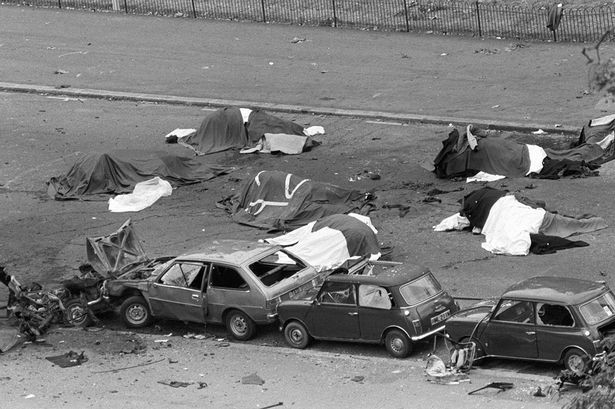Suspected IRA Terrorist John Downey Will Not Face Hyde Park Bombing Prosecution

A man accused of killing four British soldiers in the IRA Hyde Park bombing will not face prosecution because of "assurances" that he would not stand trial.
John Downey has been wanted for more than 30 years for the murder of four members of the Household Cavalry during the Changing of the Guard procession in July 1982 in the royal park.
But Mr Justice Sweeney ruled that the 62-year-old should not stand trial because he was given an official assurance, even though that assurance was a mistake. After talks with attorney general Dominic Grieve to discuss the judge's ruling, the Crown Prosecution Service said it would not appeal.

Lt Anthony Daly, 23, Trooper Simon Tipper, 19, Lance Cpl Jeffrey Young, 19 and Sqdr QM Cpl Roy Bright, 36, died after a nail bomb exploded in the boot of a parked car. Seven horses were killed and 31 people were injured.
On the 25th anniversary of the attack, Downey, who was convicted of IRA membership in the 1970s, who had denied murder and conspiracy to cause an explosion, received a letter from the Northern Ireland Office assuring him that he was no longer under threat of arrest.
The letter, sent as part of the landmark Good Friday Agreement, said: "There are no warrants in existence, nor are you wanted in Northern Ireland for arrest, questioning or charging by police. The Police Service of Northern Ireland are not aware of any interest in you by any other police force."
PSNI Chief Constable Matt Baggott said the force accepted the court's decision that Downey should not be prosecuted and accepted full responsibility for its failures.
He said: "We will be referring this matter to the Police Ombudsman for Northern Ireland.
"I wish to apologise to the families of the victims and survivors of the Hyde Park atrocity. I deeply regret these failings, which should not have happened. We are carrying out a check of these cases to ensure the accuracy of information processed by the PSNI."
It is thought the controversial decision could have an impact on other cases. Some 187 suspects wanted in connection with offences committed during the Troubles, also known as "on the runs", could have been given similar assurances, it was feared.
What are "on-the-runs"?
- Suspects of paramilitary offences during The Troubles
- Not covered by the original Good Friday Agreement
- UK government agreed in 2001 to give assurances that there would be no prosecutions of "OTRs" if organisations were supporting the peace process and on ceasefire - 187 received letters similar to John Downey's
- Sinn Fein submitted John Downey's name to government scheme
Source: BBC
Sweeney said: "When the defendant received his [2007 assurance] letter he was entitled to and did believe that it was the product of careful and competent further work, and that there had been a genuine and correct change of mind about him - particularly given that he was a supporter of the peace process.
"However, that assurance was wholly wrong. Thus, as the prosecution conceded, the defendant was wholly misled.
"Clearly, and notwithstanding [the Good Friday Agreement], the public interest in ensuring that those who are accused of serious crime should be tried is a very strong one with the plight of the victims and their families firmly in mind.
"However, in the very particular circumstances of this case it is very significantly outweighed by the overlapping public interest in ensuring that executive misconduct does not undermine public confidence in the criminal justice system and bring it into disrepute, and the public interest in holding officials of the state to promises they have made in full understanding of what is involved in the bargain."
© Copyright IBTimes 2025. All rights reserved.




















